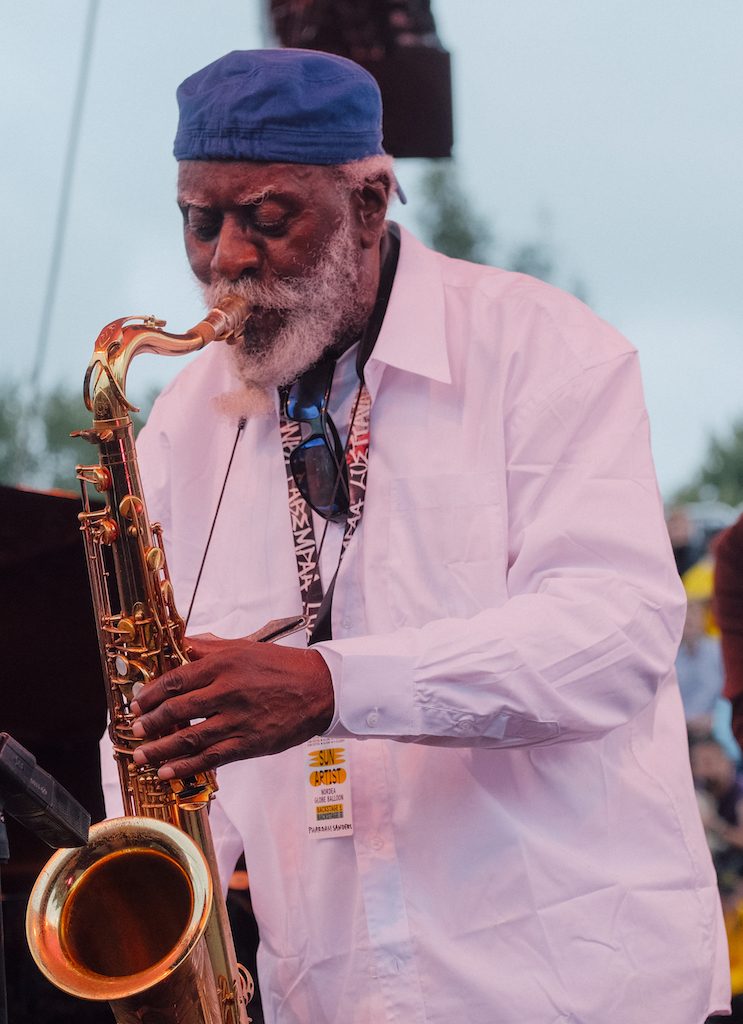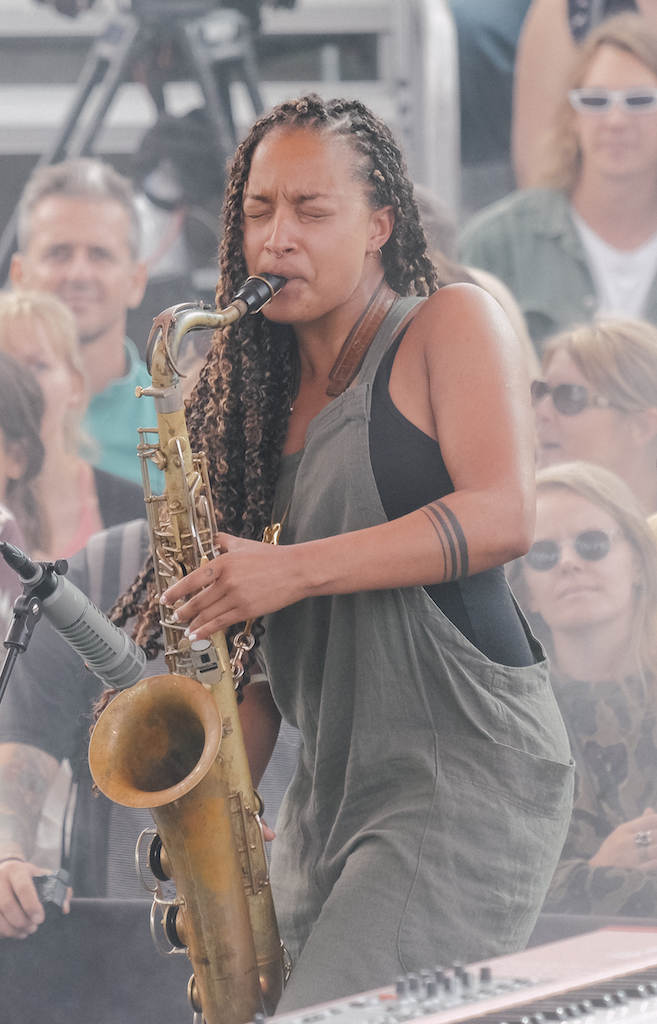Helsinki’s burgeoning jazz scene has been showcased at Flow since it was launched a decade and a half ago. Now nearly 20 times larger with major electronic, rock and hip-hop headliners, it still gives pride of place to improvised music. Jazz is spotlighted along with African, Middle Eastern and folkier sounds on the round outdoor Balloon Stage, away from the booming bass of the main stages.
Nearby, the We Jazz collective runs a tasteful popup vinyl shop with vintage furniture and a Persian rug. A brewpub serves craft beer made on the spot while bottle and can returns go to offset the festival’s carbon footprint. The festival is equally progressive in music programming, with a track record of booking acts before they break into the mainstream, and of gender balance. There was a pleasing symmetry to this year’s half-dozen jazz acts, with day each split evenly between female and male-led bands as well as local and international acts.
Helsinki trio Elifantree started on the first day with quirky, passionate art-rock that shows the three members’ impressive jazz experience – drummer Olavi Louhivuori, for instance, has played with Tomasz Stańko and Marilyn Crispell, while saxophonist Pauli Lyytinen collaborates with Verneri Pohjola and Raoul Björkenheim. The focus though is on startling Turkish-Swedish singer and multi-instrumentalist Anni Elif, with a voice that swoops over many octaves and emotions within a few bars, echoing Kate Bush or Annette Peacock. On the long finale, I Love You from last year’s Anemone, she subtly improvised with voice and keyboards in a duet with Lyytinen on the electronic wind instrument (EWI), its sound morphing from fretless bass to soprano sax.
There were more emotive female vocals that evening, with Erykah Badu showing off her scat singing, Solange (Beyoncé’s edgier younger sister) her impressive horn section, and Neneh Cherry (Don Cherry’s stepdaughter) an overview of her career from punk and hip-hop through her work with Scandi-jazz trio the Thing and her latest electronic album.
Back at the Balloon, drummer Makaya McCraven brought in a quintet of Chicago jazzmen, most of whom also play with R&B and hip-hop acts. For instance tenorman Irvin Pierce has played with Solange, as well as leading his own quartet with McCraven in the drum chair.
In this line-up, Pierce often seemed to lead the rest of the band in basic rhythm chores on the sax while the bandleader concentrated on expressive solos that never went on too long. All played interlocking repetitive parts with astounding precision and discipline, unvarying as hip-hop samples.
McCraven, looking like a mafia boss in fedora and dark glasses, ran a tight ship with a much more focused sound than on his sometimes chaotic cut-and-paste albums. He often laid down a fairly repetitive, hip-hoppy groove that built hypnotically, sounding almost like minimalist Steve Reich at times. For instance the opening tune, The Bounce, took a long time to develop from its slow, extended intro; finally tenorman Irvin Pierce and guitarist Matt Gold erupted into stinging solos toward the end.
The two fought running battles later, approaching a free jazz free-for-all toward the end of Atlantic Black, though Gold’s solos often had a curiously detached, rote feel.
More interesting was keyboardist Greg Spero, who soulfully played the Wurlitzer as bassist Junius Paul sang Tony Williams’ moody There Comes A Time, a slice of mellow 1970s funk-fusion with a late-2010s update.
On Saturday afternoon, Helsinki jazz stalwarts saxophonist Timo Lassy and drummer Teppo Mäkynen attracted a standing-room-only crowd under sunny skies. Both are known for playing crowd-pleasing groove and soul-jazz sounds, but this time they didn’t let the crowd off easily, offering subtle minimalist exploration from their new album, recently reviewed in Jazz Journal.
The two have played together for more than 15 years, but have managed to find new dimensions in their partnership and their instruments, including Lassy’s circular breathing and Mäkynen’s discreet colouring with synth drums.
Later on the same stage, Mäkynen showed off his poppier chops in a set with Liberian-Finnish singer/rapper Jesse Markin.
Then it was time for Nubya Garcia, who delivered the most engaging jazz set of the weekend. Returning to Finland just a few weeks after a Pori Jazz appearance, the London saxophonist offered assured playing that hits the sweet spot between technical acrobatics, storytelling, poignancy and ecstatic spirituality.
Her expression ranged from keening to velvety, sounding almost like Ben Webster on a closing solo ballad. Keyboardist Al MacSween provided tasty backgrounds from Fender Rhodes groove to electro-dub, in tandem with explosive drummer Sam Jones. Stand-up bassist Daniel Casimir shone on the solo intro to Pace, a new composition inspired by life in Camden Town. Garcia’s own smiling enjoyment of it all was infectious, as was her humility and eagerness to support her posse rather than do an ego trip.
Another expressive saxophonist in her 20s who occasionally delves into dub, Adele Saurus, gamely led her trio Katu Kaiku in the first set of Sunday – but their meditative jazz struggled to be heard amidst a downpour at the uncovered outdoor venue despite the best efforts of bassist Mikael Saastamoinen of OK:KO and drummer Erik Fräki of Virta.

The skies cleared for Pharoah Sanders, who turns 80 next year and trudged slowly onstage as his trio played Welcome by his old partner John Coltrane.
He shook the decades off as he began to play, though. As ever, his tenor sound was by turns tender, subtle, edgy and screechy, if not as nimble as his days with the Coltranes – which he again recalled with a succinct solo on Giant Steps. It was driven energetically by pianist Benito Gonzalez, precisely underpinned by the rhythm section of Oliver Hayhurst and Gene Calderazzo.
Though Sanders’ singing is no longer a melodious yodel and was hampered by microphone issues, the packed crowd helped out by singing along on High Life and The Creator Has A Master Plan. This was a moment to savour, eyes wide shut, waves of sound washing over in the late-summer sun.
Flow Festival, Helsinki, Finland, 9-11 August 2019
















